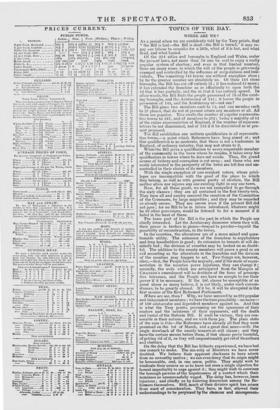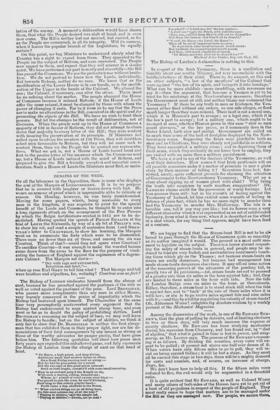TOPICS OF THE DAY.
WHERE ARE WE ?
AT a period when we are confidently told by the Tory prints, that " the Bill is lost-the Bill is dead-the Bill is buried," it may re- pay our labour to consider for a little, what of' it is lost, and what dead, and what buried. Of the 214 cities and boroughs in England and Wales, under the present laws, not more than 70 can be said to enjoy a really popular system of election ; and even in that limited number, there are many cases in which the will of the people is grievously cramped and controlled by the influence of col porations and indi- viduals. The remaining 144 towns are without exception close ; by far the greater number are absolutely so. Of these 144 close boroughs, the Bill has cut off entirely 56 ; it has reduced 42 more; it has extended the franchise so as effectually to open both the 42 that it has partially, and the 46 that it has entirely spared. In other words, the Bill finds the people possessed of 70 of the exist- Mg boroughs, and the Aristocracy of 144 ; it leaves the people in possession of 148, and the Aristocracy of-not one !
The Bill gives two members each to 12, and one member each to 27 places, that do not at present return any members at all. All these are popular. This swells the number of popular representa- tive towns to 187, and of members to 292 ; being a majority of 81 of the entire representation of England, if the number of represen- tatives be not diminished, and of 112 if it be diminished as at pre- sent proposed. The Bill establishes one uniform qualification in all representa- tive towns,-a point which Reformers have long aimed at ; and this qualification is so moderate, that there is not a tradesman in England, of ordinary industry, that may not attain to it.
While the Bill gives a qualification to every respectable member of the community in the town where he resides, it takes away his qualification in towns where he does not reside. Thus, the grand source of bribery and corruption is cut away ; and those who are really interested in the prosperity of the town are left free and un- controlled in their choice of its members.
With the single exception of non-resident voters, whose privi- leges are incompatible with the good of the place to which they belong, as well as with general purity. of election, the Bill neither alters nor injures any one existing right in any one town. Now, for all these goods, we are not compelled to go through the sixty clauses ; they are all contained in the first twenty-two. They have all and sundry received the sanction of the Committee of the Commons, by large majorities ; and they may be regarded as already secure. They are secure even if the present Bill did riot piss ; for no Bill to be in future introduced, whatever might be its other provisions, would be listened to for a moment if it failed in the least of these.
The town part of the Bill is the part in which the People are chiefly interested. Let the Aristocracy domineer where they will, their power is broken in pieces-brayed to powder-beyond the possibility of reconstruction, in the towns.
In the counties, the alterations are of a more mixed and ques- tionable utility. The extension of the franchise to copyholders and long leaseholders is good ; its extension to tenants at will de- cidedly bad ; the division of counties may be looked on as doubt- ful. The addition to the county members will prove a good or an evil according as the alterations in the franchise and the division of the counties may happen to act. Two things are, however, clear,-first, the People have the majority, and if the mode of repre- sentation in the counties prove injurious, they can change it; secondly, the evils which are anticipated from the Marquis of CHANDOS'S amendment will be destitute of the force of prescrip- tive tolerance, and the People can have no scruple to use their power if it be necessary. If the 50/. clause be susceptible of as great abuse as many believe, it is not likely, under such circum- stances, to be greatly abused. If it be, it will be abrogated in the first session of the first Reformed Parliament.
Where are we, then 2 Why, we have secured to us 292 popular and independent members ; we have the bare possibility-no more- of 180 aristocratic and dependent members against us. And this is what the Tory prints, presuming on the ignorance of their
i
readers and the indolence of their opponents, call the death and burial of the Reform Bill. If such be victory, they are rea- sonable in their notions, and we wish them joy. The plain state of the case is this-the Reformers have already all that they were promised on the 1st of March, and a great deal more-with the single drawback of the county tenants-at-will clause ; and they have the certain means before them, if that clause prove harmful, of getting rid of it, as they will unquestionably get rid of its authors and abettors.
On the delay that the Bill has hitherto experienced, we have but one remark to make. The sincerity of Ministers we have never doubted. We believe their apparent slackness to have arisen from no unworthy motive ; we can even fancy that its origin might be honourable, and, in one sense, politic. They might wish to vindicate their course so as to leave not even a single objection for honest impartiality to urge against it ; they might wish to convince the borough patrons of the hopelessness of a contest which their nominees so unsuccessfully waged. The delay has, however, been injurious ; and chiefly so by fostering dissension among the Re- formers themselves. Still, much of their divisive spirit has arisen from want of conSideration. They have, in fact, allowed their understandings to be perplexed by the clamour and misrepresen. tation of the enemy. A moment's deliberation would have shown them, that what the People desired was nigh at hand, and is even now come. The Bill is neither lost nor marred, but carried, as far as the People are concerned, in all its integrity. Will its success, when it leaves the popular branch of the Legislature, be equally certain?
On this point, we beg Ministers to understand clearly what the Country has a right to expect from them. They appealed to the People on the subject of Reform, and were answered. The People now appeal to them, and expect that they will answer in a similar spirit. We have performed our part honestly and cheerfully—the Bill has passed the Commons. We use the preterite tense without hesita- tion. We do not pretend to know how the Lords, individually, feel towards Reform, neither do we care. We know that as the modification of the Lower House is in our hands, so is the modifi- cation of the Upper in the hands of the Cabinet. We altered the one ; the Cabinet, if necessary, can alter the other. There must be no refining about the matter. The people changed the House of Commons because it refused Reform ; if the House of Lords offer the same refusal, it must be changed by those with whom the power of changing it rests. Far be it from us to say that the Peers are to make no alterations in the Bill, conceived in the spirit and for promoting the objects of the Bill. We have no wish to limit their powers. But let the changes be the result of deliberation, not of divisions. When the people sent up to the House of Commons a majority of-130 in favour of Reform, they did not attempt to chain down that majority to every letter of the Bill; they were content with insuring the preservation of its principle. If Ministers feel called upon to advise the creation of 130 Peers, they will doubtless select men favourable to Reform, but they will no more seek to control them, than we the People did to control our representa- tives. What we ask is, not a House of Lords bound hand and foot to the precise letter of the measure which the Commons send up, but a House of Lords imbued with the spirit of Reform, and prepared to give the Bill a friendly reception and impartial consi- deration. Such a House of Lords the Ministers must find, or make.



























 Previous page
Previous page